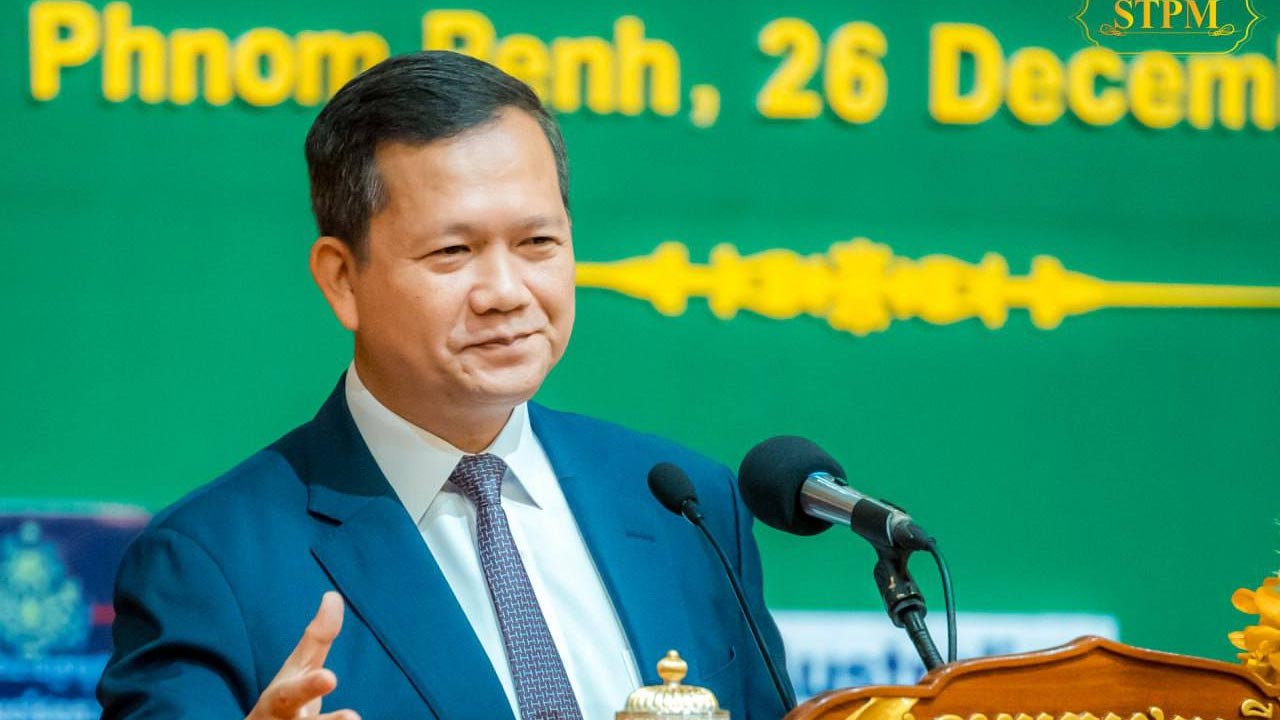Selected Comments Samdech Moha Bovor Thipadei Hun Manet, at the release of the national report on the final results of the 2022 economic census
 Selected Comments Samdech Moha Bovor Thipadei Hun Manet, at the release of the national report on the final results of the 2022 economic census
Selected Comments Samdech Moha Bovor Thipadei Hun Manet, at the release of the national report on the final results of the 2022 economic census
[Unofficial translations]
*****************
[1]
(1) Data is a map/compass indicating geographical situation and geographical position
[…] we all know that data (and in this case the data of economic census has) an important (role) as a map or compass for us […] for (firstly,) it lets us know the geographical situation, (which) does not refer only to the geography of the land. It can be geopolitics, geoeconomics, and business […], and secondly, it tells us where we are on this geographical map […] without data, we do not know what is around us or cannot predict what will happen. We seem to be at a point where it is easy to get lost (as we do not know) where we are and where to go […] many companies in the world have invested in setting up their own database […]
(2) Adequate data helps in comprehensive decisions and predicts future changes
[…] Having a good collection of data, firstly, it helps us to make the right decision from all angles, and we do not make riskily hasty decision […], and secondly, we can predict the scenario and/or the future, how it changes […] that will help in planning actions and policy directions […] if we cannot predict how the situation will develop, we will fall behind the situation, and we cannot be proactive. The best we can do is to have reaction (of course). The word reaction often means one erases the problem, cleanses the problem. It means that one put up a fence after the cow already ran away […]
(3) Adequate data makes forecasts more effective and on-target activities
The forecasts in the economy, for example, in 2024, what sectors will emerge (after the Covid-19 pandemic) and what sectors need to be given potential. This is possible based on data. For example, tourism. How do we see the world’s travel data this year? Which direction do tourists go? What products they are looking for? […] the same goes for educational planning. The Ministry of Education has launched two study plans/fields – STEAM (science, technology, engineering, the arts, and mathematics) and STEM (science, technology, engineering, and mathematics) based on progress of forecasts (of professional need) that requires people with knowledge and/or knowhow of technology, mathematics, engineering, (and it requires that we have) to prepare a policy in advance […]
(4) Use data to react/predict the future and help monitor and evaluate policies
The Royal Government uses data in two ways […] the way I mentioned (above) is to be proactive and predict the future to ensure competitiveness is one thing, but another important thing that the data help us is monitoring, inspection, and evaluation […] the development of a policy framework or action plan requires monitoring and evaluation, readjustment or strengthening in a timely manner […] in the organization and launching of various action plans, there always are indicators to evaluate, verify, and with those indicators, we need data and the monitoring system to see if everything we have laid out is sufficient or right? […]
(5) Cambodian officials compiled the 2022 economic data on their own
[…] The economic census 2022 is the compilation of such data for the second time […] the first census was in 2011 […] when the data status was in technical difficulty. At that time, we had almost no human resources and relied entirely on technical support from our friends. Our participation was limited. In 2022, however, the Cambodian officials not only did a good data census, but also importantly have the ability to do self-research, although we still need technical assistance from some partners […] this is something we should be proud of […] (as we have been) strengthening the national capacity […]
(6) The 2022 economic census data for the work of the Royal Government of the 7th legislative term
This 2022 assessment has a specific task for (serving the affairs of) the seventh legislative term government. The 2022 data that we used is in relation to the census of economic entities […] that first of all show the progress over the period of these 10 years. What is the socio-economic status and how is the economic unit structure, both informal and formal. Second, it helps assess the impact of the Covid-19 pandemic as to what is the economic situation in the post Covid-19 period, and what are the challenges […] these data are derived from information enumerated by questions and what do we do with the information. First of all, it tells us where are we […] and second of all, where are we going? In particular, it aligns with the priority policies of the seventh legislative term government, and strengthens all sectors in formulating social protection policies aimed at intervening in the informal economy and/or agricultural (sector labor) […]
(7) Develop a policy based on the updates of actual data on the ground
These are the essentials of compiling our 2022 data, which we do every 10 years. What we have this year is an important basis for our country to move forward in achieving the National Strategic Development Plan 2024-2028 and the sectoral strategic development plan to be implemented in the coming 2024. The policy framework is not based on what we research in the air, (I mean) data posted on Facebook, posted by international institutions, which is old data. It must be based on the updates of actual data on the ground that sets out specific policies, not imaginatively, emotionally or vaguely, but based on actual data […]
(8) Data collected and disseminated by the Ministry of Planning is reliable
The data (collated and) put out by the census, like it or not, is the one that is reliable. Other source is not possible to conduct an alternative census to provide such information. Therefore, it is required to determine the quality of the data since it is (extracted and compiled) by the Ministry of Planning. I do not believe any company would go back to generate data as such across the country. We have set that data as a base. The Royal Government, the Ministry of Economy and Finance, all the ministries would not send officials to conduct their own census because there is no budget, no time, and no skills. We all rely on this collective data. Apart from that, it is also a lantern to set light for attracting investment. The data we have is an indicator of both domestic and foreign investment in job creation and helps scholars to build this data (availability) […]
[2]
May (9) the Ministry of Planning pay attention to strengthening the National Institute of Statistics, both in structure and human resources. This is an important task. (National Institute of Statistics) is the unit responsible for collecting (data), therefore, must collect raw data properly. If its data collection is wrong or incomplete […] there can be problems. Therefore, it is necessary to review and prepare officials, the work of such strengthening is to further clarify how we need to play a role in strengthening this national institution […]
[3]
(10) All institutions must pay attention to allocating people and budget to the statistics office
Data is important. While the National Institute of Statistics is important, so is (this work) in all institutions. Effort must be made to strengthen offices that are assisting our brain. Policy documentation compilation/collation as well as statistical skills are very important, and linked to the policy design. I seek all ministries and institutions to pay attention to and encourage the allocation of people as well as the allocation of budget (for their own statistics offices) […] because their task is to collect and analyze the data […] they are the staff with their important role to help each minister and other leaders in setting direction (for their work activities). We encourage all staff to get involved in compiling and managing strategic policies […]
(11) Three guidelines for reform in the field of public functions
In the reform of public functions (I have given) three guidance – first, the recruitment of new officials must be of perfection and of meritocracy; second, the adjustment of the internal structure in response to modernization, which means in line with the current situation and forecast for the future; and third, establish a central incentive system to focus on certain skills that need help […] I would like to ask the working group of the National Commission for Civil Service Reform, which focuses on officials in the policy framework, and more importantly, officials of this data professional framework must consider providing some level of incentive to ensure the attraction and retainment of human resources to work in this career […]
(12) Improve structural framework and encourage statistics skill incentives
In each ministry, there are those who are working on the policy framework, such as putting together the action plan, and there are those who take the plan into actions. The twos have to help each other. If there is no clear policy framework to set the direction for action plan, those who implement the plan do not know what to do and what are the indicators to monitor their activities […] Planners need data from the bottom up. Both are equally important. I urge all ministries to first think of improving the structural framework, plus internal incentives, how we can facilitate; and secondly, what can the Royal Government prepare as a framework to encourage further and focus on in terms of data (professional) skills […] we need to do (this work) to increase the capacity to build and think strategically […]
(14) Analysis and forecasting require human resource
The Royal Government needs all these (analysis and forecasting) works. Those who do this work are encouraged as this work requires human resources essentially. The most important thing is people. Investing in people is an important task, both in terms of training from small to large scale, and investing in targeted officials in the institution, especially in the field of policy or a data (related careers), either at the Institute of Economics, the National Institute of Statistics and even the agricultural one relating to R&D. Numerous ministries need to do this work so that we can be proactive […] let us not draw a map only after the situation has evolved […] we need to research, look at the map before taking a departure and/or where we get to at a certain point, we need to review […] this point is related to strengthening the capacity of the institution […]
(15) The third pillar of public service reform is to focus on key skills and make them more effective
Not only the Ministry of Planning, but also officials of all institutions must take care and build the officials who are in charge of (data collection/collation or statistics) work, […] try to attract them and keep them […] because they are our assistants. They help provide us data upon which we think and take action, i.e. the assistance to the brain, to be honest […] we need a data scientist who is a science fortune teller for us. Please pay attention to both the resource and the allocation of internal resources, pay attention to the internal incentive framework of the institution and the Royal Government […] this is the goal of the third pillar reform or the third key activity in public functions reform, which focuses on key skills and making them more effective […]
[4]
(16) Training and using the right skills, while conducting internal structural reform
The key is (to have regular internal training and capacity building). To be able to retain a person with skill, we need to know the value and recognize the importance […] in the army […] when I conducted reform […] I ask if there is this unit in there? Where have all the professional officers gone? The answer (was that) there is no such unit in the structure. If there is no such unit in the structure, what do you do the training for? […] it is not like that. There must be a framework structure […] The second reform focuses on internal structural reforms. We need to identify where it is important to prepare or reinforce. Where it only needs adjustment. As in this data job, adjusting the structure, organizing people, training and equipping them, and major of all is their utilization. The term utilization is the only key to ensuring institutional sustainability. If we fail to make use (of the trained officials), to give them the task, to encourage them, sooner or later they will begone […] this is the experience (that I have come across and) some institutions may have strong (skills) and some institutions may have to but still weak. I want all institutions to have professional capacity and ownership or that means we have staff doing assistance jobs to our brain […]./.






